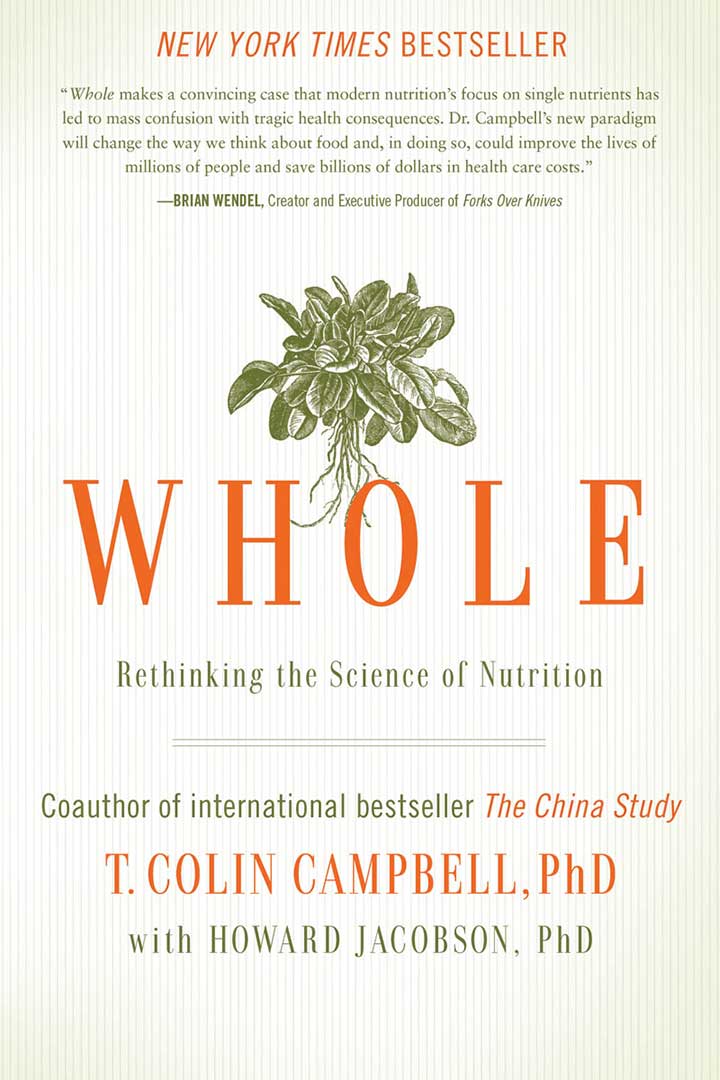Whole: Rethinking the Science of Nutrition


What is Wholism?
Wholism is a lens through which we might view the world differently—a critical concept that emphasizes the interconnectedness of the parts of every whole. It can be applied to our understanding of many different fields: biology, psychology, ecology, and more. Though wholism does not reject the study of parts, it does incorporate what we learn about parts into a greater context. A wholist believes, as Aristotle expressed over two millennia ago, that “the whole is greater than the sum of its parts.”
The health of an individual body is a great example of a “whole” that exceeds the sum of its “parts”—the complex, integrated systems within our bodies that support health (all the way down to the cellular level) have been fine-tuned throughout our long evolution as a species, and none of these systems is completely independent of the others. They all work together, rely on each other, and are constantly readjusting to suit the greater cause of maintaining whole balance. To understand health in this way, through the lens of wholism, is to understand the limits of our need to distinguish between parts.
Relevant Articles
Paradigms: Wholism vs Reductionism
A paradigm is a model, often unseen, that 1) determines how we approach the world, 2) informs how we receive and understand new information, and 3) shapes how we integrate new discoveries alongside the information we already have. Understanding how paradigms work is critical to understanding how we understand. Whether we are conscious of them or not, they determine the course we take; in fact, you might say that they are the course we take.

Wholism is only one paradigm. Another more dominant paradigm is reductionism, which is characterized by many things that seem opposite to wholism. For example, a reductionist is, “accustomed to thinking of [the body] as a collection of individual parts and systems, in which solitary chemicals do solitary, unrelated things.” As the name implies, reductionism is focused on reducing wholes to their parts—breaking things down to better understand the individual components.
These paradigms are not necessarily incompatible. Wholism does not reject reductionism, either in theory or in practice. Instead, wholism encompasses reductionism. Problems only arise when one paradigm dominates so completely over the other that we are no longer even aware of the control it exerts over our thinking, and that’s exactly what has happened in nutrition (and medicine more broadly). Examples of reductionism in these fields include:
- the research that is considered “best” is most often that which focuses on individual nutrients, rather than broad dietary patterns;
- an outsized focus on individual chemicals or genes as contributors to disease, rather than multifaceted lifestyle factors;
- highly targeted, technological approaches to disease treatment (perhaps best illustrated by the pharmaceutical industry) that produce huge costs and unpredictable side effects and yet consistently fail to address the basis of disease.
Wholism in Nutrition
Reductionism in nutrition can serve a valuable role. Discovering the inner workings of individual macro and micronutrients can help us to fill in the gaps of our understanding. However, nutrition cannot be understood by only the study of its component parts in isolation. Because nutrition, as it operates in the body, is far more complex than these individual reactions studied in isolation.

An illustration of our reductionist approach to nutrition, by which we reap an ever-more-complex understanding of chemical reactions in food, and yet do not address epidemics of nutrition-related diseases—cardiovascular disease, diabetes, cancer, etc.—and astronomically high health care spending.
By shifting toward wholism, we would continue to improve our understanding of the parts, but also begin to examine the complex, interconnected impact of multiple nutrients working on multiple health outcomes. This is how nutrition works in the real world: we do not consume single nutrients in isolation, but do consume whole foods (comprised of numerous nutrients) in a varied diet.
One example of reductionism’s dominance in nutrition is the booming nutrient supplement industry, projected to reach a market size of $216.3 billion by 2026.[1] This industry is predicated on reductionism at every step of the way—from how supplements are developed to how their benefits are researched and reported on.
Wholism in Disease Treatment
Reductionist medicine tends to view diseases as distinct, with highly specific causes and highly specific treatments (applied by highly skilled specialists). In other words, the approaches to diagnosis, prevention, and treatment are all very compartmentalized.
In cancer, for example, one researcher is devoted to testing carcinogenic toxins. Another, quite separately, investigates the genetic roots of the disease’s progression. A third, perhaps working in the pharmaceutical industry, argues that if we could only identify the highly specific mechanisms of the disease, we might then be able to develop drugs that interfere with those mechanisms. Though we might learn something from this approach, when it dominates completely, it can become very restrictive, especially when the disease’s cause and treatment are more complex, as in diseases related to a lifetime of poor nutrition.
Reductionist medicine encourages us to view disease response and disease prevention as distinct. We prevent heart disease with exercise, stress management, and a “heart-healthy diet,” but once the disease has developed, the notion that we might reverse it by the same measures is not given as much attention as surgical and pharmaceutical approaches (e.g., bypass surgery). For many, the prescription of dietary change to a heart disease patient might even seem irresponsible.
The human body is divvied up between different medical specialists, each with their own reductionist approach. And though this approach is very effective for dealing with certain situations (bone fractures, certain infections, etc.), it does not cohere as well with the integrative effects of nutrition. In a medicine that is dominated by the reductionist paradigm, wholistic nutrition will never play a large role. This is one reason why medical doctors are not trained in nutrition and why there is no designated institute of nutrition at the National Institutes of Health (NIH).
Whole Health

One of the side effects of viewing health as a sum of parts—as in a reductionist framework—is that we can focus on one element of health without giving due attention to other, related elements of health. In other words, we can obsess over the impact of certain actions on certain aspects of health, but without attention to breadth. It is by this reductionist logic that a “health nut” might focus heavily on a weight loss regime without improving the other components of their personal health. Likewise, it is how we might focus on personal health alone, without paying mind to its connections to communal health and ecological health.
A reductionist framework is very susceptible to misalignment, and this misalignment is reflected at every level of our health-seeking enterprise. There are countless examples, including:
A reductionist framework is very susceptible to misalignment, and this misalignment is reflected at every level of our health-seeking enterprise. There are countless examples, including:
- we seek public policy solutions to health problems without giving individuals—even doctors—adequate education in nutrition;
- we try to “plug our holes” with a medley of drugs and supplements, while consistently poisoning our wholes;
- we tell individuals to “be more responsible,” but we fail to curb industry’s profit-driven influence over what is available, affordable, and recommended by national dietary guidelines;
- we tell our children to eat more fruits and vegetables, but permit the influence of industry in designing national food programs, including the school lunch program;
- we make the job of producing food in an ecological and sustainable way very difficult and costly, and in fact incentivize farmers to do the opposite.
The food system is rife with such imbalances. By adopting a more wholistic perspective, we might begin to appreciate the interconnections between the challenges we face. Learn more about how we are putting wholism into practice to create resilient, regenerative systems of health through food.

Whole: Rethinking the Science of Nutrition

In Whole, T. Colin Campbell, PhD, explains the science behind the evidence that a whole food, plant-based diet is the healthiest way to eat. He explores the ways our current scientific paradigm ignores the fascinating complexity of the human body, and why, despite overwhelming evidence that everything we think we know about nutrition is wrong, our eating habits haven't changed. Whole is an eye-opening, paradigm-changing journey through cutting-edge thinking on nutrition, a scientific tour de force with powerful implications for our health and for our world.
References
- Cision PR Newswire. Dietary supplements market to reach USD 216.3 billion by 2026. Reports and Data. https://www.prnewswire.com/news-releases/dietary-supplements-market-to-reach-usd-216-3-billion-by-2026--reports-and-data-300969115.html (December 4, 2019).

